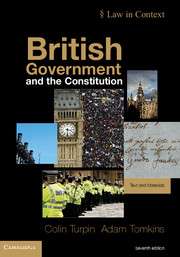Book contents
- Frontmatter
- Contents
- Preface
- Acknowledgements
- Abbreviations
- Table of Cases
- Table of Statutes
- Table of European Treaties
- Part I Constitution, state and beyond
- 1 The British constitutional order
- 2 The ideas of the constitution
- 3 Constitutional sources
- 4 Devolution and the structure of the UK
- 5 The European dimensions
- Part II Government
- Part III Accountability
- Part IV Liberty
- Index
3 - Constitutional sources
from Part I - Constitution, state and beyond
- Frontmatter
- Contents
- Preface
- Acknowledgements
- Abbreviations
- Table of Cases
- Table of Statutes
- Table of European Treaties
- Part I Constitution, state and beyond
- 1 The British constitutional order
- 2 The ideas of the constitution
- 3 Constitutional sources
- 4 Devolution and the structure of the UK
- 5 The European dimensions
- Part II Government
- Part III Accountability
- Part IV Liberty
- Index
Summary
In previous chapters we have seen that for a true view of the constitution we must take account of its rules, its institutions and its ‘ideas’ or theories. In this chapter we outline the various sources of the British constitution and, in particular, the sources of the rules of the constitution. Some of these are legal rules, making up the ‘law of the constitution’; others are rules of practice, known as ‘constitutional conventions’. During the course of the chapter, we shall consider what are the distinctive features of constitutional laws and conventions, and also the relationship between these two kinds of rules.
Legal rules
Dicey (The Law of the Constitution (1885), p 203) held it to be one aspect of the rule of law in England that:
the principles of private law have with us been by the action of the courts and Parliament so extended as to determine the position of the vCrown and of its servants; thus the constitution is the result of the ordinary law of the land.
Dicey’s statement needs qualification. It fails to take account of the extra-ordinary powers deriving from the royal prerogative, or of the ‘law and custom of Parliament’, which has developed separately from the ‘ordinary’ law. But the statement is more seriously misleading in that a large part of modern constitutional law consists of enactments conferring powers on public authorities, principles developed by the courts in interpreting and giving effect to those enactments, and remedies of exclusive application to public bodies: a corpus of public law, in short, which cannot be explained as a mere extension of private law rules to the administration.
- Type
- Chapter
- Information
- British Government and the ConstitutionText and Materials, pp. 160 - 209Publisher: Cambridge University PressPrint publication year: 2011



